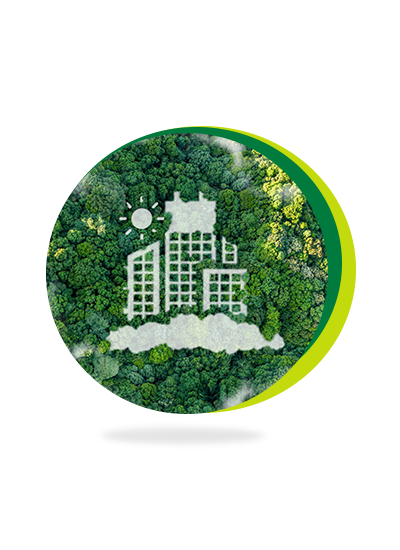We are here for a sustainable future!
We are proud to be Turkey's first Bank to achieve a corporate governance grade and are conscious of our responsibilities. We keep track of our compliance with corporate governance principles at the board of directors level and aim to improve it. We work nonstop in line with our sustainability objectives, in compliance with the United Nations Sustainable Development Goals, to deliver our children the best possible future.
What are we doing for Sustainable Banking?
Sustainability Developments in 2024
- In 2024, we continued to advance our Sustainable Banking strategy by working closely with our stakeholders and actively representing our Bank in industry associations and unions.
- Thanks to our investments in clean energy, 60% of the electricity used in our operations now comes from renewable sources, supported by our solar power plant in Edirne and I-REC certified electricity supply.
- Verified data shows that our Scope 1 and Scope 2 emissions have dropped by 41.6% compared to 2021.
- We also reduced our water consumption per employee by 3% compared to last year.
- We were proud to be awarded the highest possible score, A, in the CDP Water Security assessment.
- Building on our decarbonization efforts, we successfully completed the validation of our SBTi target in 2024, following our commitment made in 2023.
- We continued to support the Empowerment and Employment Access of Young Developers Affected by Disasters Project while also launching the Şekerbank YEP program – an impact-driven career program designed to prepare young talents for the banking sector.
- Together with our Central Procurement and Strategy & Sustainable Banking departments, we set up the Sustainable Supply Chain Working Group to promote a socially inclusive and environmentally responsible approach across all stages of our supply chain.
- We successfully implemented the ISO 14001 Environmental Management System and earned certification in 2024.
- The second phase of our Paperless Banking Project was launched, with the goal of fully digitalizing our internal communications.
- We strengthened our waste management practices by emphasizing the importance of proper waste separation at source.
- To raise awareness among our teams, we introduced the role of Social and Environmental Ambassadors (SEA) at our branches and provided them with comprehensive sustainability training.
- Our agricultural loan portfolio grew by 136% year-on-year, increasing its share in our total loan book from 7.6% to 13.5%.
- Through the Turkey Green Economy Financing Program (GEFF II), we secured €25 million from the European Bank for Reconstruction and Development (EBRD) to support rural development and sustainable agriculture.
- We launched the Şekerbank Training Program (YEP), a pioneering career program designed to prepare the next generation of banking professionals.
- In collaboration with our Training and Development Department, we organized sustainability-focused trainings, with 32.5% of our employees taking part in the 2024 waste management program.
- By working with local authorities, we reduced food waste generated in our cafeteria by 50% compared to the previous year.
Sustainability Goals in 2025
- As of 2024, our sustainable agriculture loan portfolio accounts for 92.7% of total agricultural loans, and we aim to increase this ratio to 100% in the coming years.
- We aim to reduce our Scope 1 and Scope 2 total carbon emissions resulting from our activities by 5% compared to the previous year.
- By 2028, we aim to reduce our combined Scope 1 and Scope 2 greenhouse gas emissions by 43%.
- We seek to extend our efforts to reduce greenhouse gas emissions and contribute to global sustainability solutions not only to our own operations but also across our customer base.
- In line with our sustainable finance approach, we aim to increase our green financing ratio by supporting projects in renewable energy, energy efficiency, digitalization, and circular economy.
- To support local development, we aim to strengthen our positive impact on society by increasing microfinance and sustainable SME loans.
- With this approach, which plays a critical role in combating climate change, we aim to provide financial support to areas such as renewable energy investments, energy efficiency projects, and sustainable agricultural practices—thereby reducing environmental impacts while contributing to environmental and social transformation.
- In the upcoming period, we will continue to develop biodiversity-sensitive financial products and sustainable investment strategies, further strengthening our role in the financial sector’s nature-positive transition.
